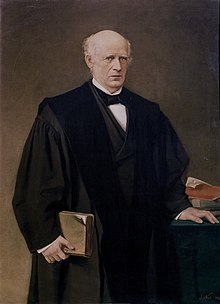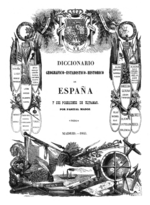| The Most ExcellentPascual Madoz | |
|---|---|
 | |
| Prime Minister of Spain | |
| In office 30 September 1868 – 3 October 1868 | |
| Monarch | Vacant |
| Preceded by | Jose Gutierrez de la Concha |
| Succeeded by | Francisco Serrano |
| Personal details | |
| Born | Pascual Madoz Ibáñez (1806-05-17)17 May 1806 Pamplona, Kingdom of Spain |
| Died | 13 December 1870(1870-12-13) (aged 64) Genoa, Kingdom of Italy |
| Resting place | Montjuïc Cemetery |
Pascual Madoz Ibáñez (17 May 1806 – 13 December 1870) was a Spanish politician and statistician.
Biography

In early life Madoz was settled in Barcelona, as a writer and journalist. He envisioned the construction of the Vielha tunnel. He joined the Progresista party formed during the First Carlist War, 1833–40. He saw some service against the Carlists; was elected deputy to the Cortes of 1836; took part for Baldomero Espartero, Count of Luchana, and then against him; was imprisoned in 1843; went into exile and returned; was governor of Barcelona in 1854, and minister of finance in 1855; had a large share in secularizing the Church lands; and after the revolution of 1868 was governor of Madrid. He had, however, no great influence as a leader and soon went abroad, dying at Genoa in 1870. He was later interred in the Montjuïc Cemetery in Barcelona.
Madoz was distinguished from most of the politicians of his generation by the fact that in mid-life he compiled what is still a book of value: a geographical, statistical and historical gazetteer or dictionary of localities in Spain and its overseas possessions, Diccionario geográfico, estadístico y histórico de España, y sus posesiones de Ultramar (Madrid, 1848–1850).
Public recognition
In Pamplona there is a street, Calle de Pascual Madoz, named in his honor.
Notes
- ^ Chisholm 1911, p. 288.
References
 This article incorporates text from a publication now in the public domain: Chisholm, Hugh, ed. (1911). "Madoz, Pascual". Encyclopædia Britannica. Vol. 17 (11th ed.). Cambridge University Press. p. 288.
This article incorporates text from a publication now in the public domain: Chisholm, Hugh, ed. (1911). "Madoz, Pascual". Encyclopædia Britannica. Vol. 17 (11th ed.). Cambridge University Press. p. 288.